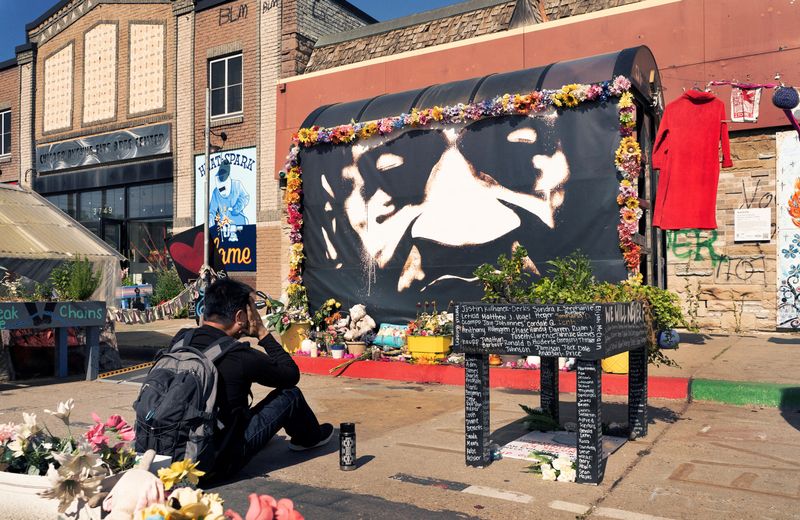By Andrew Goudsward
(Reuters) -Minneapolis on Monday agreed to systemic reforms to its police department and to submit to outside oversight after a U.S. federal investigation spurred by the 2020 murder of George Floyd uncovered a pattern of civil rights abuses.
Minneapolis and the U.S. Justice Department reached a court-enforceable agreement, known as a consent decree, that will seek an outside independent monitor to report on the city’s progress.
The city council voted 12-0 to approve the agreement, according to the city clerk and a Justice Department spokesperson.
The agreement, which must be approved by a federal judge, cements police reforms in a city put in the world spotlight in 2020 after Floyd’s murder by a white police officer touched off weeks of nationwide protests and civil unrest over racism and police violence against Black Americans.
Floyd, who was Black, died after former Minneapolis police officer Derek Chauvin kneeled on his neck for more than nine minutes.
"All eyes remain on Minneapolis, and with this consent decree, we now have a road map for reform that will help this community heal," Kristen Clarke, the head of the Justice Department's Civil Rights Division, told reporters.
The agreement requires Minneapolis to limit officers' use of force and seek prompt medical care for those injured in interactions with police. It also calls on officers to avoid using handcuffs on children younger than 14 and restricts certain police tactics during protests.
A group of civilian experts is already monitoring the Minneapolis police following a 2023 settlement. The same group will also monitor compliance with the federal agreement, Clarke said.
The settlement was finalized just weeks before Republican President-elect Donald Trump returns to office.
"It was clear that we needed to act now," Minneapolis Mayor Jacob Frey, a Democrat, said during a press conference.
Trump has been vocal in support of police, and civil rights advocates expect the incoming Trump administration to exert less oversight than Democratic President Joe Biden’s administration, which came into office pledging reforms in the wake of Floyd’s murder.
Officials declined to say whether the Trump administration could try to scuttle the agreement. The new administration could seek to reverse the Justice Department's stance.
The Justice Department investigation, which concluded in 2023, found that Minneapolis police regularly used excessive force and discriminated against Black people and Native Americans.
The probe, known as a “pattern-or-practice” investigation, was separate from the federal criminal prosecutions of four Minneapolis police officers, including Chauvin, who were convicted of violating Floyd’s civil rights.
Chauvin was sentenced to more than 20 years in prison in the federal case. He was also found guilty of state murder charges.
Pattern-or-practice investigations, which examine an entire department, often lead to consent decrees, agreements filed with a court that mandate reforms and often years of outside monitoring.
Minneapolis is the second U.S. city to reach such an agreement following an investigation started by the Biden Justice Department, despite the department starting a dozen police department investigations over the last four years.
Louisville, Kentucky, struck its own agreement with the Justice Department last month.

Other cities, including Phoenix, have resisted outside oversight and objected to Justice Department findings. Several probes have only been completed in recent weeks, leaving little time to finalize court agreements before the end of the Biden administration on Jan. 20.
Trump vowed during his presidential campaign to increase legal protections for police. The Justice Department in his first term curtailed the use of pattern-or-practice investigations and sought to challenge previously negotiated court agreements, viewing them as overly burdensome for police departments.
